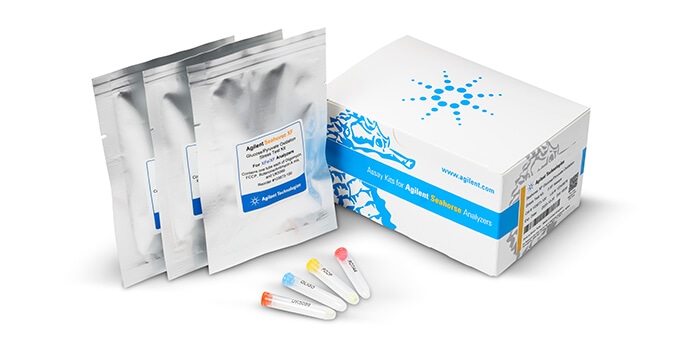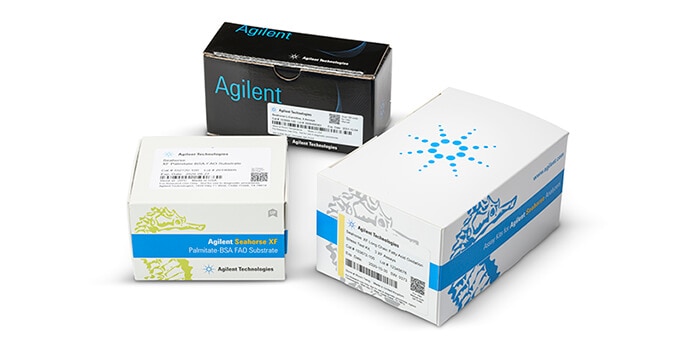Agilent Seahorse XF Substrate Oxidation Stress Test kits
Discover Which Substrates Impact Your Cells'
Fate, Function, and Fitness
Agilent Seahorse XF Substrate Oxidation Stress Test kits

across research areas
In cancer biology, immunology, or drug discovery research, you want to know which substrates are relevant or required for cell function and phenotype, and how you can control cell phenotype and fate via manipulation of substrate oxidation activity.
Cancer cells change their substrate preference to meet their needs for rapid proliferation and to adapt to the metabolic requirements in the microenvironment. For many years, Seahorse XF technology has facilitated the study of cellular metabolism, providing increased understanding of tumor cells' metabolic needs and helping in the design of cancer therapies. Check out these peer-reviewed publications to gain better understanding of substrate dependency and cancer biology:
-
Understanding the intersections between metabolism and cancer biology.
Vander Heiden and DeBerardinis, Cell (2017), 168: 657–669. -
A review of the basics of mitochondrial bioenergetics, metabolism, and related signaling pathways in cancer cells: Therapeutic targeting of tumor mitochondria with lipophilic cationic compounds.
Kalyanaraman et al., Redox Biology (2018), 14: 316–27.
Metabolic programming is emerging as a critical mechanism for altering immune cell activation, lineage commitment, and function. XF Substrate Oxidation Stress Tests can be used with various types of immune cells to investigate substrate dependence or reliance on one or more substrates for correct immune cell differentiation and/or function.
Check out these peer-reviewed publications to gain better understanding of substrate influence and immune cell function:
-
Induction of innate immune memory: The role of cellular metabolism.
Domínguez-Andrés et al., Current Opinion in Immunology (2019), 56: 10–16. -
Fatty acid metabolism in CD8(+) T cell memory: Challenging current concepts.
Raud et al., Immunological Reviews (2018), 283: 213–31.
Mitochondrial substrate oxidation is relevant for driving cell phenotype and function. The different metabolic requirements of the diverse cell types (normal or diseased) present a unique opportunity for the development of novel therapies in many disease areas.
Check out these peer-reviewed publications to learn about recent advances in the role of metabolism in drug discovery:
-
Targeting metabolism to regulate immune responses in autoimmunity and cancer.
Patel et al., Nature Reviews Drug Discovery (2019), 18: 669–688. -
Targeting immuno-metabolism to improve anti-cancer therapies.
Beezhold and Byersdorfer, Cancer Letters (2018), 414: 127–35.
Learn more about metabolic reprogramming and substrate oxidation in other research areas (stem cell, cardiovascular, diabetic disease research, etc.):
Glutamine oxidation is indispensable for survival of human pluripotent stem cells.
Tohyama et al., Cell Metabolism (2016), 23(4): 663–74.
Agilent now offers a suite of assay kits that enables the nondisruptive assessment of how cells oxidize three primary mitochondrial substrates: long chain fatty acids (LCFA), glucose/pyruvate and glutamine. Providing standardized assay protocols, validated reagents, and cloud-based Seahorse Analytics software, these assays allow you to quickly obtain interpretable, functional substrate oxidation data.

Seahorse XF Substrate Oxidation Stress Test profile of the respiration parameters critical for substrate demand
The Agilent Seahorse XF Substrate Oxidation Stress Tests combine substrate pathway–specific inhibitors with the XF Cell Mito Stress Test to reveal dependence on a specific metabolic substrate. Attain insights into a wide range of biological processes, including:
- Identify mitochondrial substrate dependencies that drive particular cell function or uncover metabolic liabilities in cancer cells.
- Explore how substrate reliance can lead to cell fate decisions for immune cell differentiation and function.
- Reveal how demand for a specific mitochondrial substrate is affected if an intervention, such as a genetic manipulation or drug treatment, is applied to the cell.
For Research Use Only. Not for use in diagnostic procedures.



